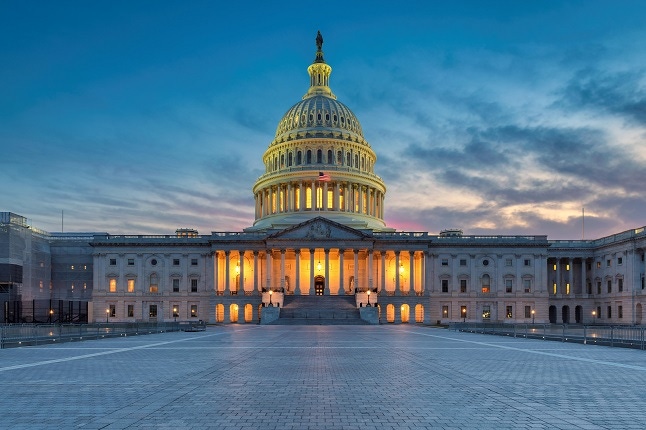Last month in global tech policy: How law-makers are handling Ukraine war; chip shortages; crypto mining's climate impact; spyware companies; USB-C chargers. Plus, what Supreme Court's EPA ruling means to Tech and why Big Tech's attorneys are squabbling.

Welcome back to the June 2022 issue of Citizen Tech, InformationWeek’s policy bulletin. This month we are looking at the endless march of Biden’s semiconductor bill through Congress, Supreme Court's ruling against the EPA, the Pegasus spyware makers’ trip to visit European Parliament, international USB requirements, cryptocurrency’s environmental impact, and the war in Ukraine.
W. Virginia v. EPA: Supreme Court and Tech
On the last day of June, the Supreme Court ruled 6-3 that the Environmental Protection Agency (EPA)’s Clean Power Plan, which forced power plants to reduce their CO2 emissions or pay a penalty, was unconstitutional. The New York Times explains that the “major questions doctrine,” a tenet of Republican jurisprudence, requires Congressional approval for any executive-branch action with “significant economic effects.” The Clean Power Plan, part of Biden’s greater push toward a green economy, had no explicit direction from Congress, so the court struck it down.
It’s hard to judge what the impact will be on the tech sector as whole. As of July 1, the electric car lobbying group ZETA (Zero Emission Transportation Association), which represents companies like Tesla, has not commented, either by press release or on social media; presumably they will voice some delicate concern over this measure, which makes their plan to transform America’s automobile fleet look less inevitable. But strangely, as Barron’s has pointed out, investors seem loath to slow down the green transformation. The stock value of fossil fuel companies actually fell slightly in the wake of the decision.
One sector that will have cause to rejoice is, as ever, cryptocurrency. NCB reports that the WV v. EPA ruling implicitly chastens regulatory bodies like the SEC and the Commodity Futures Trading Commission (CFTC), both of which, as we’ve seen, are keen to control the crypto market.
Maybe that’s optimistic on the part of the Red Bull cowboys. Carol Goforth, professor of law at the University of Arkansas, told NBC that “I don’t see the Court (or most federal court judges for that matter) being overly concerned that the SEC is operating too broadly.”
War Bulletin No. 4
As the Ukraine War presses back to its former, eastern frontier, new revelations in the New York Times point to complications in the cyber war. A Microsoft study released on June 22 suggests that the Kremlin’s cyber campaign has been less successful than expected in terms of breaches, with only a 29% success rate in their 128 discrete attacks on targeted networks. (See the March Citizen Tech for a quick summary of the quickly-defused FoxBlade attack.)
This anemic result is likely the work of robust private-public partnerships in cybersecurity. (It’s a rather favorable conclusion for Microsoft, one of the leading contractors in Eastern Europe and the Baltic, but that doesn’t mean it’s wrong.) However, the study found that Russia’s information war has seen far better results, garnering serious social media engagement in the United States and other countries.
In terms of conventional war tech, POLITICO has reported that the “cutting edge” ordnance that Congress promised Ukraine is arriving too slowly to have much impact on the war. In May, Congress approved a plan to send $40 billion in aid to beleaguered Ukraine through September; half of that was to go to weaponry.
Part of the problem is that the most advanced weapons, like RQ-20 Puma drones, require significant, expensive training, which delays its usefulness. But several anonymous sources have pointed to the choked bureaucratic rigmarole at the Pentagon, made worse by a vacancy in acquisitions only filled in April.
Biden's Chip Plan Stuck
President Biden’s $52 billion plan to boost domestic semiconductor production has foundered in the Senate, as Bloomberg reports. Perhaps predictably, the resistance has come from Republicans, encouraged by recent inflation and with an eye on the midterms; Democratic leadership, hyperfocused on culture issues like guns and abortion, have no room on the agenda for something as mundane as computer chips. Offstage, a number of Trump-era pundits have called the bipartisan bill too favorable to China, although as Bloomberg notes, none of the bill’s three biggest corporate beneficiaries -- Samsung, Intel, and the Taiwan Semiconductor Manufacturing Company -- are Chinese; in fact, the deeper economic ties with Taiwan proposed by the bill make the conservative claim look rather bizarre.
What will it take for the White House to force this bill through? A few key Republicans might yet be won over (and perhaps a few dissenters on the left, notably Sen. Sanders of Vermont). But perhaps, as Bloomberg implies, the motivation will come from abroad. South Korea and Germany are watching the progress of this bill carefully; Intel has already invested billions this year in Europe, as Citizen Tech has reported, and seems more interested in finding receptive governments than necessarily building in the US. Progress on its enormous (and expensive) plant in Ohio has ground to an unsatisfying halt. Biden has offered the carrot; the stick may be next.
The Spies Slip By
The NSO Group, the Israeli spy firm whose Pegasus software has been deployed against journalists and world leaders alike, appeared before the European Parliament on June 21 in an elaborate parody of contrition. According to EURActiv, NSO general counsel and chief compliance officer Chaim Gelfand admitted to having “made mistakes” but insisted that NSO had passed up major (undivulged) contracts on ethical grounds. The Hungarian government’s spying on opposition leaders, and Mexican drug cartels’ digital tracking and assassination of reporters, seem to have cleared that high bar. There is, said Gelfand, a “due diligence review.”
USB-C Charger Mandate
As the New York Times reports, the European Commission declared this month that all laptops, smartphones, ear buds, wireless devices like keyboards, and other appliances will have to use a standard USB-C charger, regardless of their manufacturer, by 2024. This will save European consumers quite a bit of headache in the long run after an annoying couple years of transition: you won’t need to carry separate chargers for all your appliances, or realize too late you’d bought the wrong one.
But it’s also an aggressive political move by the bloc.
American Big Tech firms have long resented European regulatory attention; this bill will domesticate them further, and Apple’s November 2021 letter to the Commission expressed grave concerns about what the company sees as overreach. The fact that Apple has not commented since is surely a sign of victory for Europe.
It will be interesting to see if the USB-C mandate becomes, like GDPR, the next in a series of EU tech regulations that force the rest of the world to keep up. Notably, the United Kingdom, it its bloody-minded post-Brexit temper, has already declined to enact a matching USB-C mandate. A spokesperson for the Johnson government told the BBC that “strict regulation mandating just one type of connector stifles innovation rather than encouraging it, which in turn will harm consumers in Europe and around the world.”
Big Tech and the ABA
The American Bar Association seems an unlikely battlefield for Big Tech, but POLITICO reports that June saw a major rift among its members over exactly that. Late in May, ABA leadership issued an open statement to Congress, attacking proposed antitrust regulation that would force Big Tech firms to let consumers use any brand of appliance with their products -- a bill similar in spirit to the European USB-C legislation. The bill is called the American Choice and Innovation Online Act, and will appear on the Senate floor in a few weeks.
This letter sparked turmoil within the ABA, with a curious air of the old guild wars of the Middle Ages. Lawyers representing smaller tech firms have accused the more influential, Big Tech lawyers of steering the Association closer and closer to a kind of advocacy group for Apple and Microsoft. The signers of the letter, for their part, have insisted that the text contained nothing new or unreasonable, was carefully vetted by the ABA’s antitrust council, and passed unanimously.
Nonetheless, POLITICO notes that 15 of the 22 signers are corporate defense lawyers whose firms, like Latham & Watkins and Hogan Lovells, represent Facebook, Amazon, Google, and the other tech behemoths. POLITICO has called this turmoil a “rebellion.” It remains to be seen how accurate that dramatic word will prove.
Green Crypto?
Early this month, Crypto Briefing looked into the White House’s most recent investigation into crypto mining. Like governments around the world, the Biden administration has handled crypto and its partisans like a wild dog, with more caution than sympathy. That barely concealed, mutual hostility is unlikely to change, especially since the White House is now looking into one of the lesser-known aspects of crypto mining: its environmental impact.
White House science and technology officer Costa Samaras told Bloomberg Law that crypto investors have to take responsibility for the real-life carbon emissions generated by their digital sorcery, as well as “noise, local pollution, [and] older fossil generators being restarted in communities.”
It’s another attempt to control a rogue, but Crypto Briefing, a source quite honest about its biases, seemed to approve of the nuance and seriousness with which the White House has approached this issue. A rapprochement may not be impossible after all.
What to Read Next:
Global Tech Policy Briefing: March 2022
About the Author(s)
You May Also Like







